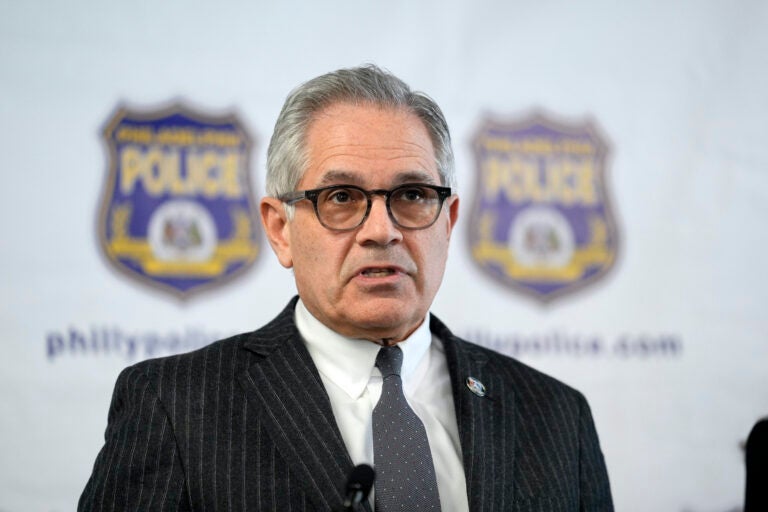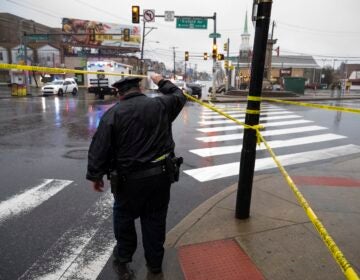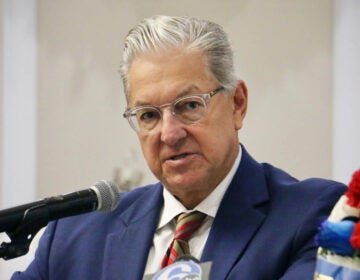Court upholds law taking jurisdiction over SEPTA crimes from Philly DA Larry Krasner
A divided Commonwealth Court turned down Krasner's argument that the law passed late last year by Republicans in the General Assembly violates the state Constitution.

File: Philadelphia District Attorney Larry Krasner takes part in a news conference in Philadelphia, Monday, March 11, 2024. (AP Photo/Matt Rourke, File)
The elected prosecutor in Philadelphia lost a court decision Friday in his lawsuit seeking to halt a law that directed the appointment of a special prosecutor by the attorney general’s office to handle crimes on the city’s mass transit system.
A divided Commonwealth Court turned down District Attorney Larry Krasner’s argument that the law passed late last year by Republicans in the General Assembly, along with dozens of Democratic votes, violates the state Constitution.
Krasner, a Democrat, sued over the law in January, arguing it unconstitutionally stripped him of geographic jurisdiction, removed his core prosecutorial functions and other grounds. His office said he planned to comment on the decision later Friday.
The law gives the special prosecutor the ability to take over crimes “within” the Southeastern Pennsylvania Transportation Authority, known as SEPTA, and when that occurs, requires the district attorney to suspend investigations and proceedings and turn over the files to the special prosecutor.
It was passed amid concerns by some about crime in Philadelphia and their belief that Krasner’s progressive policies have made the situation worse. Krasner argues he’s prosecuted the vast majority of crimes that come to his office from SEPTA. Democratic Gov. Josh Shapiro signed the law.
In a dissent, Judge Christine Fizzano Cannon said the law improperly delegates the General Assembly’s legislative authority, allowing the special prosecutor to decide what “within” means in regard to SEPTA. She said that was too vague and a fatal defect in the law. Cannon and two other judges said they would have thrown out the law.
“SEPTA is an agency. It is an entity. It is not a specific place or a tangible thing. The meaning of ‘within’ in relation to SEPTA conveys no concrete impression to the ordinary person; it is simply incomprehensible,” Fizanno Cannon wrote.
She argued the law also violates the due process rights of criminal defendants by preventing them from challenging the special prosecutor’s authority.
Attorney General Michelle Henry’s office told the court last week it was about to make a firm job offer to a candidate for special prosecutor, the majority opinion noted. A message seeking comment was left for her spokesman.
The law gave the state attorney general 30 days to appoint the new special prosecutor, who can’t have worked for that office or Krasner’s in the past six years. The prosecutor’s costs would be reimbursed by the city, and the attorney general’s office would foot the bill for a per diem salary, equal to the pay of a district attorney.
The SEPTA prosecution jurisdiction bill’s primary sponsor, Sen. Wayne Langerholc, a Republican from Cambria County, has said he envisioned the special prosecutor as picking and choosing which crimes to pursue, leaving the rest to Krasner. The law is set to expire along with the end of Krasner’s second term in December 2026.
Krasner also is awaiting a Supreme Court decision about whether the state Senate can proceed with a trial regarding whether to remove Krasner from office. Republicans who controlled the House last session voted to impeach Krasner, but trial in the GOP-majority Senate is on hold while the high court weighs the matter.

Get daily updates from WHYY News!
WHYY is your source for fact-based, in-depth journalism and information. As a nonprofit organization, we rely on financial support from readers like you. Please give today.





